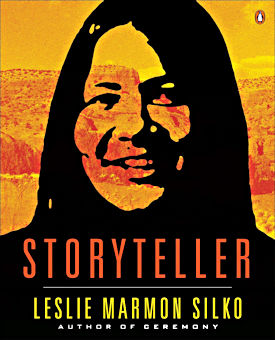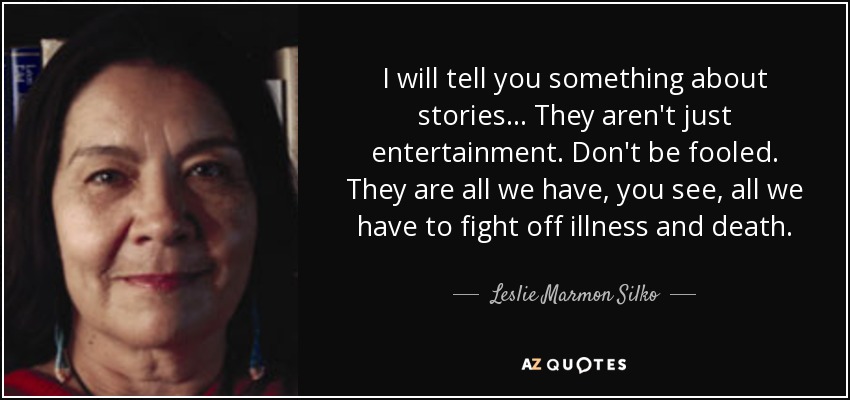Leslie Marmon Silko is a Laguna Pueblo Native American writer who is best known for her novels, short stories, and poetry. She is one of the most important figures in Native American literature, and her work has been praised for its lyrical beauty, its complex exploration of Native American culture and history, and its political activism.
Silko was born in Albuquerque, New Mexico, in 1948. She grew up on the Laguna Pueblo Reservation, and she learned about her Native American heritage from her family and community. After attending the Bureau of Indian Affairs school in Laguna and a Catholic school in Albuquerque, Leslie Marmon Silko graduated from the University of New Mexico, where she studied English and creative writing.
After graduating, she worked as a teacher and a journalist.
In 1965, she married Richard C. Chapman, and together, they had a son, Robert Chapman, before divorcing in 1969.
In 1971, she and John Silko were married. They had a son, Casimir Silko. This marriage also ended in divorce.
She then enrolled in and then dropped out of law school, and then published her first book of poems, Laguna Woman, in 1974 and her first novel, Ceremony, in 1977.
Ceremony is a novel about a young Laguna Pueblo man who returns from World War II traumatized by his experiences. The novel explores the themes of war, memory, and cultural identity. Ceremony was a critical and commercial success, and it won the National Book Award for Fiction.
Throughout her career as a writer and teacher, she has remained grounded in the history-filled landscape of the Laguna Pueblo. Her experiences in the culture have fueled an interest to preserve cultural traditions and understand the impact of the past on contemporary life.
 Silko’s third book, Storyteller, was published in 1981. Storyteller is a collection of short stories, poems, and essays. The stories in Storyteller are based on Laguna Pueblo oral tradition, and they explore themes of love, loss, and the relationship between humans and the natural world.
Silko’s third book, Storyteller, was published in 1981. Storyteller is a collection of short stories, poems, and essays. The stories in Storyteller are based on Laguna Pueblo oral tradition, and they explore themes of love, loss, and the relationship between humans and the natural world.
It was a finalist for the National Book Award.
The stories in “Storyteller” are told from the perspectives of both Native American and non-Native American characters. They explore topics such as the impact of colonization on Native American communities, the importance of oral tradition, and the power of storytelling. The book has been praised for its lyrical prose, its rich imagery, and its complex and nuanced portrayal of Native American life.
“Storyteller” is considered to be one of the most important works of Native American literature. It has been widely read and studied by scholars and students alike. The book has also been adapted into a film and a stage play.
Silko’s fourth book, Almanac of the Dead, was published in 1991. Almanac of the Dead is a novel that spans centuries and tells the story of the colonization of the Americas. The novel is a powerful indictment of colonialism and a celebration of Native American culture.
Silko has also written a memoir, The Turquoise Ledge, and a book of essays, Yellow Woman and a Beauty of the Spirit. She has also collaborated with the poet James Wright on a book of letters, With the Delicacy and Strength of Lace.
Silko is a recipient of numerous awards, including the MacArthur Fellowship, the National Book Award, and the Native Writers’ Circle of the Americas Lifetime Achievement Award. She is a member of the American Academy of Arts and Sciences and the PEN American Center.
Here is a brief summary of each of Silko’s books:
Laguna Woman: Poems (1974): A collection of poems that explore the themes of love, loss, and the relationship between humans and the natural world.
Ceremony (1977): A novel about a young Laguna Pueblo man who returns from World War II traumatized by his experiences. The novel explores the themes of war, memory, and cultural identity.
Storyteller (1981): A collection of short stories, poems, and essays. The stories in Storyteller are based on Laguna Pueblo oral tradition, and they explore themes of love, loss, and the relationship between humans and the natural world.
Almanac of the Dead (1991): A novel that spans centuries and tells the story of the colonization of the Americas. The novel is a powerful indictment of colonialism and a celebration of Native American culture.
The Turquoise Ledge (2010): A memoir that tells the story of Silko’s childhood and her coming of age as a Native American writer.
Yellow Woman and a Beauty of the Spirit (1996): A collection of essays that explore the themes of gender, sexuality, and the relationship between humans and the natural world.
Delicacy and Strength of Lace was released in 1986. The book is a collected volume of correspondence between Silko and her friend James Wright whom she met following the publication of Ceremony. The work was edited by Wright’s wife, Ann Wright, and released after Wright’s death in March 1980.
Leslie Marmon Silko is a groundbreaking writer who has made significant contributions to Native American literature and culture. Her work is powerful, lyrical, and thought-provoking, and it continues to inspire readers around the world.


